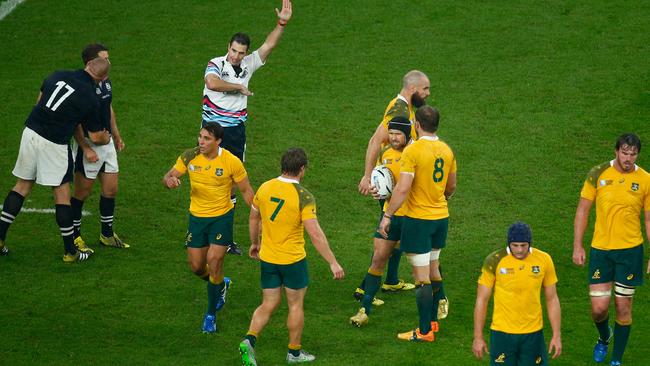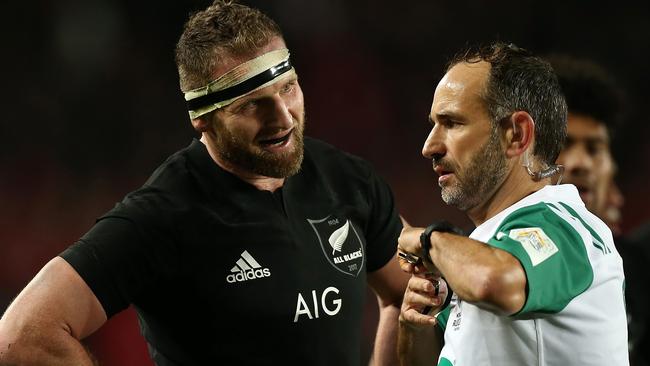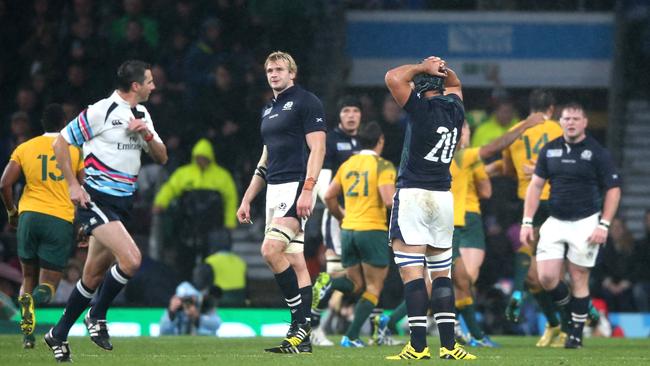Rugby doesn’t lend itself to DRS exactitude
There’s too much room for interpretation for a DRS system to work in rugby.

Surely if the ball-tracker shows that the delivery would have missed the stumps, that should be it. End of appeal. There is no need for any of the other checks. Unless, of course, the ball travelled through to the keeper and the fielding side was attempting to have 50 cents each way – appealing for either the lbw or, if there did happen to be a faint edge, caught behind.
Granted, there may well be timing issues involved in the order of technology and it may be that the third umpire works his way through hot spot and snicko in order to give the ball tracker time to load. But clearly time is of the essence. Notice, for example, how these days the third umpire already has checked that the ball was a fair delivery while the fielding side is still agonising over whether to call for a DRS. Once that wasn’t the case. Rather, the third umpire would incorporate that check into the overall on-air process. Now, an overstep only comes to light if, in fact, there was a no-ball.
It’s a fairly inconsequential matter in the grand scheme of things. But all sports have their issues with ball-in-play time and time being wasted. Even if the time-wasting isn’t deliberate, it’s still a rare day in Test cricket when all the required overs are bowled by the scheduled stumps time.
So it will be intriguing to see whether rugby goes down the line recommended by New Zealand of introducing its own DRS system, otherwise known as the captain’s challenge. Like cricket, its intent is to avoid the howler. But would a captain’s challenge really avoid that.
Take, for instance, two of the most controversial refereeing decisions of the modern era, both of which had huge consequences. The first came in the 2015 World Cup quarter-final where, right on full-time, South African referee Craig Joubert awarded Australia a penalty because he deemed Scotland’s Josh Hardie to be off-side after the ball bounced forward into his arms off teammate Josh Strauss, despite the fact that Nick Phipps was also contesting possession.
Hardie was ruled to have been in an off-side position and Bernard Foley stepped up to kick the last-gasp penalty goal that enabled Australia to win 35-34. That prevented Scotland from going through to the semi-final stage for the first time since 1991 and eventually led to Australia reaching the final.

The second controversy came in the deciding third Test between the All Blacks and the British and Irish Lions in 2017. Lions fullback Liam Williams spilt the ball forward after being challenged in the air by NZ captain Kieren Read, with Lions forward Ken Owens catching it and then dropping it like a hot potato once he realised what he had done.
Referee Romain Poite of France initially called a penalty but it then dawns on him that this single decision will decide the series. So he conferred with his touch judges and the TMO, Australia’s George Ayoub, and changed his call to accidental off-side and set a scrum, All Blacks feed.
Same decision, different calls. Joubert gave a penalty, Scotland lost and the referee had to suffer the indignity of World Rugby issuing an apology to the Scots. Granted, it was a dreadfully messy passage of play and there is no doubt that Phipps complicated the issue by contesting the ball once Strauss had knocked it forward. But he, like Joubert, was acting in the moment, with Australia behind 32-34 with only seconds on the clock.
In retrospect, Joubert almost certainly got it wrong – and, no, I’m not being guided by the World Rugby statement throwing him under the bus because that surely counts as one of the most shameful acts in World Cup history.

But does that means that Poite got it right? And, if so, which particular decision was he right with? His initial call to award the All Blacks a penalty or with the one where he overruled himself and awarded a scrum. Referee Scott MacLean insists a penalty was the correct decision – and it probably was – but then he’s Kiwi and he would say that. Besides, as MacLean argues, the All Blacks made a host of other errors in that match and so deserved the drawn Test and drawn series.
The inescapable conclusion of all this is that rugby does not lend itself to the same exactitude as does cricket’s DRS. The ball either hits the pad outside the line of the off-stump or it doesn’t. But yes-no answers don’t come nearly so readily in rugby.
Was Owens off-side when he handled the ball? Obviously. But did his actions in dropping the ball as soon as he had caught it tilt the incident over into a grey area where Poite could justify changing his decision to accidental off-side and awarding a scrum. Possibly. It can be argued either way. What it does show is why even spectators who love the game are infuriated by it.
Could a captain’s challenge work in the game? Maybe, but how could the Kiwis possibly see that tracing back through 30 phases of play to identify a refereeing mistake is a desirable outcome? Administrators are concerned enough about time-wasting in games. Imagine having a situation where a captain could complain about one refereeing decision in each half. That, realistically, could spin out into around 10 minutes per match if both sides exercise their rights. And that is not taking into account when referees also rely on the TMO to decide if a try has been scored or a foul committed.
Rugby is too fluid a game to limit itself exclusively to right or wrong answers. As aggravating as some decisions might be, it is the team that recognises everyone makes mistakes – referees included – which generally comes out ahead.
The system is not perfect. Far from it. Perfection is not a realistic outcome. Even cricket doesn’t achieve that. That ball that dismissed Steve Smith during the India series, just clipping his leg bail … had the same ball hit him on the pad and the umpire ruled in his favour, the DRS would have come to his rescue because it was only a smidgen of the ball that brushed the stumps. He might well still be batting ….



It has always been intriguing how in cricket when the third umpire goes through the process of conducting a DRS for an lbw appeal, the ball-tracker is always the last piece of technology called into play.